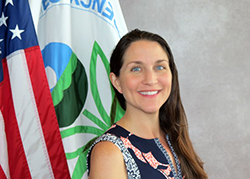Superfund Task Force Listening Session, Recommendation 6: Provide Clarification of Principles for Superfund Groundwater Remediation
Sponsored by: U.S. EPA Office of Land and Emergency Management, Office of Superfund Remediation and Technology Innovation
Superfund Task Force Recommendation 6: Provide Clarification to the Principles for Superfund Groundwater Restoration recommended actions to analyze a select group of major policies and guidances with special emphasis on: 1) beneficial use designation of aquifers in the near- or long-term, 2) remedial timeframe, 3) phased remedial approaches, and 4) completion strategy. This activity has been broadened to also include additional flexibilities such as the use of 5) monitored natural attenuation (MNA) and 6) technical impracticability (TI) waivers. EPA is seeking input on how groundwater remediation under CERCLA currently incorporates these flexibilities, limitations to their use, and potential ways to increase knowledge and application in future. This information, along with information from additional stakeholders listening sessions, will be used to inform potential future actions as the Agency strives to increase efficiency, reduce time and costs, and to improve groundwater cleanup.
The following questions are offered to assist the participants in focusing comments in response to the Listening Session materials.
- Of the six flexibilities identified and contained in existing EPA guidance, which do you find the most useful in selecting and implementing groundwater remedial strategies and remedies?
- What aspects of the six policy flexibilities would benefit from clarification?
- Can you identify any issues in the use of the six flexibilities?
- How useful is the current Groundwater Beneficial Use Designation policy and could additional clarification be made?
- What lines-of-evidence for monitored natural attenuation are the most useful in making an MNA determination and are there possible new lines-of-evidence based on advances in science?
- How can current EPA MNA policy be clarified to better address ineffective remedies?
- What are the most important factors to consider in determining an appropriate site-specific remedial timeframe?
- How are current and future groundwater use and other flexibilities factored into a remediation timeframe analysis?
- What clarifications to existing Technical Impracticability (TI) guidance would be useful to evaluate the site for TI applicability?
- Is clarification needed for the successful use of a phased approach in a groundwater remedy?
- Are the advantages of a phased approach to groundwater remediation clear and understandable, and how is phasing most effectively applied?
- In your experience, has the use of a completion strategy or plan been useful in facilitating a common understanding amongst all parties for steps and metrics needed for achieving completion goals?
- How has the use of a completion strategy or plan resulted in optimizing or changing the current groundwater remedy?
A separate delivery for Environmental Groups & General Public will be hosted on June 18th, 2020. For more information on that session, please click here.
Accessibility, Recording, and Content Disclaimer
Rehabilitation Act Notice for Reasonable Accommodation
It is EPA's policy to make reasonable accommodation to persons with disabilities wishing to participate in the agency's programs and activities, pursuant to the Rehabilitation Act of 1973, 29 U.S.C. 791. Any request for accommodation should be made to at or , preferably one week or more in advance of the webinar, so that EPA will have sufficient time to process the request. EPA would welcome specific recommendations from requestors specifying the nature or type of accommodation needed. Please note that CLU-IN provides both alternate phone call-in options and closed captioning for all webinars, and requests for these specific accommodations are not necessary.
Webinar Recording
By participating in this CLU-IN webinar, you automatically agree to authorize recording of audio and visual content presented during this live event and consent to subsequent use of this recording in the public domain by the U.S. Environmental Protection Agency. This recording may include questions, comments and poll responses provided by you during the live event in addition to your name, voice, image or likeness. This recording will be made available after the conclusion of the live event as part of the CLU-IN webinar archives, and will remain available indefinitely. If you do not wish to consent to the recording, please do not join the live event, and contact Jean Balent at 202-566-0832 or balent.jean@epa.gov to discuss your concerns.
Content Disclaimer
This webinar is intended solely to provide information to the public. The views and opinions expressed as part of this webinar do not necessarily state or reflect those of the U.S. Environmental Protection Agency. It is not intended, nor can it be relied upon, to create any rights enforceable by any party in litigation with the United States, or to endorse the use of products or services provided by specific vendors. With respect to this webinar, neither the United States Government nor any of their employees, makes any warranty, express or implied, including the warranties of merchantability and fitness for a particular purpose, or assumes any legal liability or responsibility for the accuracy, completeness, or usefulness of any information, apparatus, product, or process disclosed, or represents that its use would not infringe privately owned rights.
Presenters:
Laurence Libelo, Chief USEPA Office of Superfund and Remediation Science Policy Branch (libelo.laurence@epa.gov or 703-603-8815)
David Bartenfelder, EPA Office of Superfund Remediation and Technology Innovation, Science Policy Branch (bartenfelder.david@epa.gov or 202-566-1066)
David has over 30 years of environmental remediation experience. He joined EPA in 1991 and has worked in RCRA Corrective Action, Hazardous Waste Identification, Mixed Waste and Bioreactor Landfills. He joined Superfund in 2005, he has mainly worked in the areas of vapor intrusion and groundwater; specifically remedy selection, MNA, TI and remedy completion.
Prior to working for EPA, he worked in the private sector engaged in merger & acquisition consultation, conducting corporate environmental regulatory analysis, site assessments and cleanups.
He has degrees from the University of Delaware (BS), Auburn University (MS) and the University of Kentucky (PhD).
Moderator:
 Jean Balent, U.S. EPA Technology Innovation and Field Services Division (balent.jean@epa.gov or 202-566-0832)
Jean Balent, U.S. EPA Technology Innovation and Field Services Division (balent.jean@epa.gov or 202-566-0832)
Ms Balent is on the staff of the EPA's Technology Innovation and Field Services Division where she has worked to collect and disseminate hazardous waste remediation and characterization information since 2003. Ms Balent manages the Clean Up Information Network website and actively supports online communication and collaboration resources available to EPA. She formerly worked with the US Army Corps of Engineers Environmental Engineering Division in the Buffalo District. Ms Balent was also a member of the SUNY-Buffalo Groundwater Research Group where she constructed and tested large scale models of groundwater flow. Ms Balent has also conducted research relating to the Great Lakes, environmental remediation, and brownfields re-development. She holds a Bachelor's degree in environmental engineering from SUNY-Buffalo and a Master's degree in Information Technology from AIU.
Webinar Slides and References:
Webinar Slides and References:
Additional Resources:
Thank you for participating in our webinar. We would like to receive any feedback you might have that would make this service more valuable.
Help & FAQs
Adobe Connect Resources
This seminar will be delivered through Adobe® Connect™ with streaming audio delivered through your computer speakers or headphones. We strongly encourage you to test your computer or mobile app prior to attending this seminar using the links below. Technical support on the day of the seminar will be very limited and subject to significant delays.
- Adobe® Connect™ Meeting Connection Diagnostic & Troubleshooting Tips
- Adobe® Connect™ Mobile Apps
- Adobe® Connect™ Visual Quick Start Guide (754KB/2pp/PDF)
Rehabilitation Act Notice for Reasonable Accommodation
It is EPA's policy to make reasonable accommodation to persons with disabilities wishing to participate in the agency's programs and activities, pursuant to the Rehabilitation Act of 1973, 29 U.S.C. 791. Any request for accommodation should be made to at or , preferably one week or more in advance of the seminar, so that EPA will have sufficient time to process the request. EPA would welcome specific recommendations from requestors specifying the nature or type of accommodation needed, such as closed captioning.
with any additional questions
If you have a suggested topic or idea for a future CLU-IN internet seminar, please contact:
Technology Integration and Information Branch
PH: 202-566-0832 | Email: balent.jean@epa.gov
Technology Integration and Information Branch
PH: 202-566-0875 | Email: adam.michael@epa.gov





